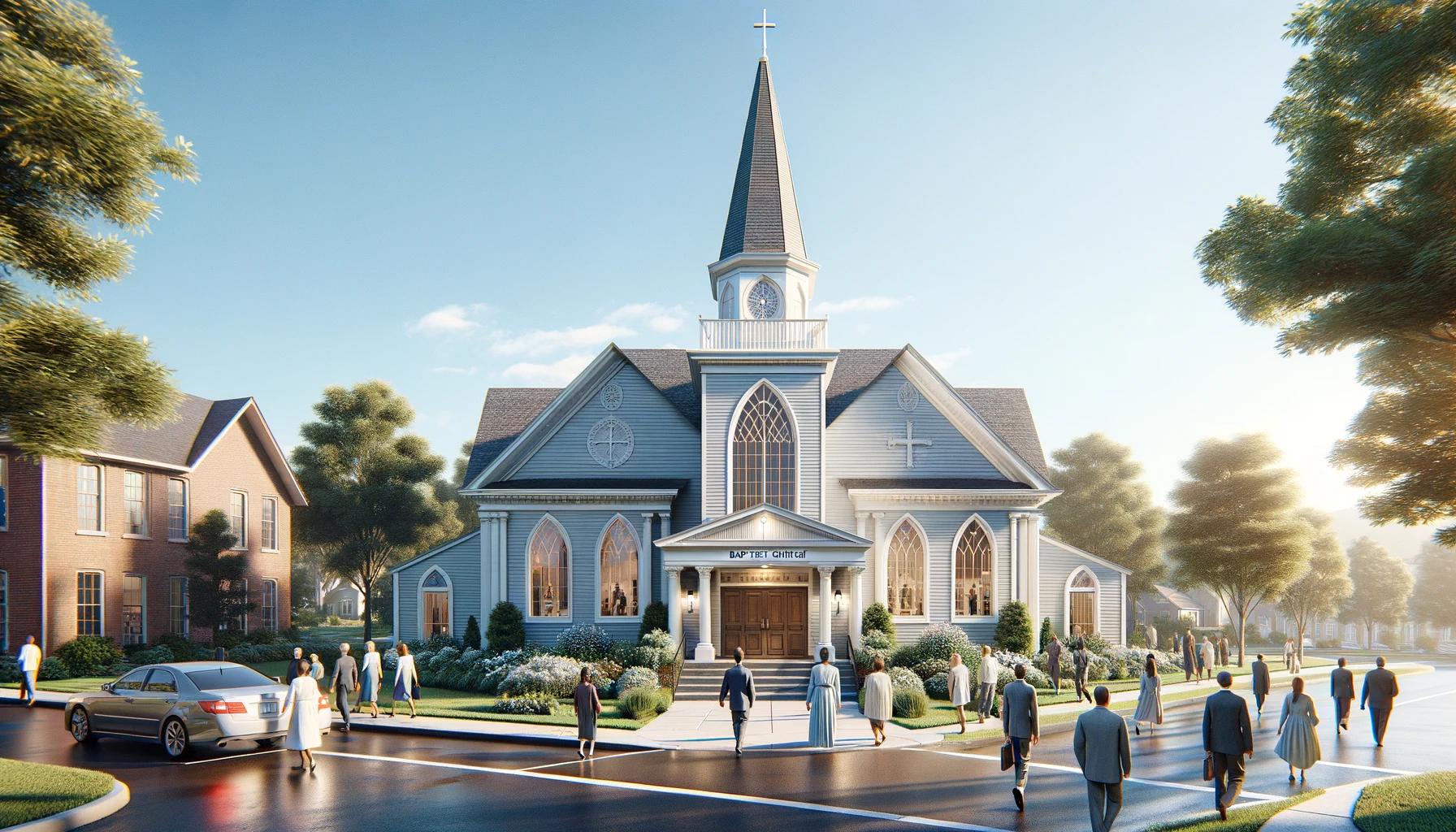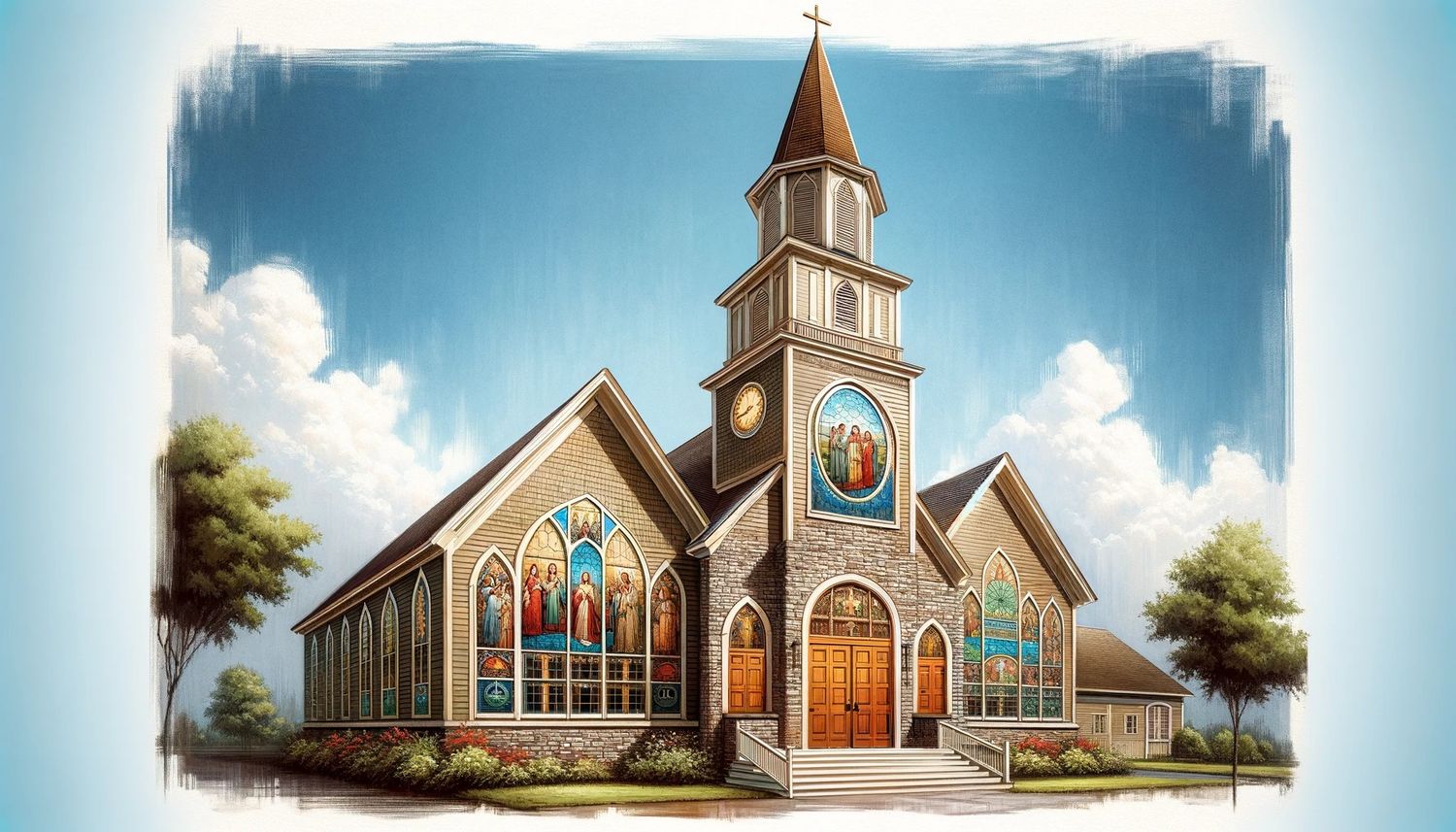Home>Theology and Spirituality>In The Baptist Church What Is A Deacon


Theology and Spirituality
In The Baptist Church What Is A Deacon
Published: February 23, 2024
Jason DeRose, Managing Editor at Christian.net, uses his expertise in religion and journalism to deepen understanding of faith's societal impacts. His editorial leadership, coupled with a strong academic background, enriches the platform’s diverse content, earning him recognition in both journalism and religious circles.
Learn about the role and responsibilities of deacons in the Baptist church. Explore the significance of deacons in theology and spirituality.
(Many of the links in this article redirect to a specific reviewed product. Your purchase of these products through affiliate links helps to generate commission for Christian.net, at no extra cost. Learn more)
Table of Contents
Introduction
In the Baptist Church, the role of a deacon is integral to the spiritual and practical functioning of the congregation. The term "deacon" originates from the Greek word "diakonos," which translates to "servant" or "minister." This title reflects the fundamental purpose of a deacon within the church community. Deacons are entrusted with the responsibility of serving and supporting the spiritual and material needs of the church and its members.
The concept of deacons can be traced back to the early Christian church, as described in the New Testament. The Book of Acts in the Bible records the appointment of the first deacons to assist the apostles in addressing the practical needs of the growing Christian community. This historical foundation underscores the significance of the deacon's role in the Baptist Church today.
Deacons are often regarded as pillars of strength within the church, embodying qualities of compassion, wisdom, and humility. Their commitment to selflessly serving others exemplifies the teachings of Jesus Christ, who Himself emphasized the importance of servanthood and humility. This ethos is deeply ingrained in the Baptist tradition, where the ministry of deacons is esteemed as a sacred calling and a demonstration of faith in action.
The role of a deacon is multifaceted, encompassing spiritual leadership, pastoral support, and practical assistance. Deacons play a vital part in fostering a sense of community and fellowship within the church, offering guidance, comfort, and practical aid to those in need. Their dedication to serving the congregation reflects the essence of Christian love and compassion, creating a nurturing environment where individuals can find support and spiritual nourishment.
As we delve deeper into the significance of deacons in the Baptist Church, it becomes evident that their role extends far beyond mere administrative duties. Deacons serve as compassionate stewards of the church, embodying the values of faith, integrity, and empathy. Their unwavering commitment to uplifting the church community and ministering to the needs of others is a testament to the enduring legacy of servant leadership within the Baptist tradition.
Role of a Deacon in the Baptist Church
Deacons hold a significant position within the Baptist Church, embodying the principles of servant leadership and ministering to the congregation in various capacities. Their role encompasses both spiritual and practical dimensions, reflecting the essence of Christian servanthood and compassion.
At the core of their responsibilities, deacons serve as spiritual leaders and mentors, providing guidance and support to church members. They often assist the pastor in ministering to the spiritual needs of the congregation, offering counsel, prayer, and encouragement to individuals facing challenges or seeking guidance in their faith journey. Through their compassionate presence and wisdom, deacons play a pivotal role in nurturing the spiritual well-being of the church community, fostering a sense of unity and shared faith.
In addition to their spiritual leadership, deacons are actively involved in the practical aspects of church administration and care. They may oversee various initiatives aimed at supporting the welfare of church members, such as organizing outreach programs, coordinating charitable efforts, and facilitating pastoral care for those in need. Their commitment to addressing the material and emotional needs of the congregation reflects the holistic approach to ministry upheld within the Baptist tradition.
Furthermore, deacons often serve as liaisons between the pastor and the congregation, bridging the gap between leadership and the broader church community. Their role involves fostering open communication, addressing concerns, and advocating for the well-being of the congregation. By maintaining a strong connection with the members, deacons ensure that the pastoral leadership remains attuned to the evolving needs and aspirations of the church body.
Overall, the role of a deacon in the Baptist Church is characterized by a deep sense of dedication, humility, and service. Through their multifaceted contributions, deacons exemplify the values of compassion, integrity, and selflessness, embodying the teachings of Jesus Christ through their commitment to serving others. Their presence within the church community serves as a source of strength, guidance, and support, enriching the spiritual journey of individuals and fostering a vibrant, caring fellowship within the Baptist Church.
Qualifications and Selection Process
The process of selecting and appointing deacons in the Baptist Church is guided by a set of qualifications and a discerning selection process that reflects the significance and responsibility associated with the role. These criteria are rooted in biblical principles and are designed to ensure that individuals embody the qualities essential for serving as spiritual leaders and stewards within the church community.
Qualifications
The qualifications for deacons are outlined in the New Testament, specifically in the book of 1 Timothy 3:8-13. These criteria serve as a foundational framework for assessing the suitability of individuals for the role of deacon. Key qualifications include:
-
Character and Integrity: Prospective deacons are expected to demonstrate unwavering integrity, moral uprightness, and a deep commitment to living out the teachings of the Christian faith. Their character should be marked by humility, honesty, and a genuine devotion to serving others.
-
Spiritual Maturity: Deacons are called to exemplify a mature and steadfast faith, displaying a deep understanding of biblical principles and a willingness to continually grow in their spiritual walk. Their lives should reflect a genuine pursuit of holiness and a dedication to living out the values of the gospel.
-
Family Life: The qualifications also encompass the individual's family life, emphasizing the importance of maintaining harmonious relationships within their household. Prospective deacons should exhibit the ability to lead and nurture their families with wisdom, grace, and love.
-
Sound Judgment: The capacity for sound judgment and discernment is crucial for deacons, as they are entrusted with providing counsel and support to the congregation. Their ability to offer wise and compassionate guidance is essential in fulfilling their role effectively.
Selection Process
The selection of deacons typically involves a deliberate and prayerful process within the church community. Congregations often establish a nominating committee or a similar body tasked with identifying potential candidates for the role of deacon. This process may include the following steps:
-
Nomination: Members of the congregation are invited to submit nominations for individuals whom they believe embody the qualifications and calling of a deacon. This initial stage allows the church body to actively participate in the discernment process.
-
Assessment: The nominating committee, in collaboration with church leadership, carefully assesses the nominated individuals against the biblical qualifications for deacons. This assessment involves evaluating the candidate's character, spiritual maturity, and commitment to serving the church community.
-
Training and Preparation: Upon identifying suitable candidates, the church may provide opportunities for training and preparation, equipping them for the responsibilities and expectations associated with the role of deacon. This may involve mentorship, theological education, and pastoral guidance.
-
Ordination: Following a period of discernment and preparation, the selected candidates may undergo an ordination process, during which they are officially commissioned as deacons within the church. This ceremony signifies their commitment to serving the congregation and upholding the values of servant leadership.
The selection process for deacons is characterized by a profound sense of reverence and discernment, reflecting the solemnity of the role and the importance of identifying individuals who exemplify the qualities of servant leadership and spiritual maturity. Through this intentional process, the Baptist Church ensures that those called to serve as deacons are equipped to fulfill their responsibilities with humility, compassion, and unwavering dedication to the well-being of the church community.
Responsibilities of a Deacon
The responsibilities of a deacon in the Baptist Church encompass a diverse array of duties that reflect their role as servant leaders and compassionate stewards of the congregation. These responsibilities extend across spiritual, practical, and pastoral dimensions, underscoring the multifaceted nature of their service within the church community.
Spiritual Guidance and Support
Deacons are entrusted with providing spiritual guidance and support to church members, offering a compassionate presence and wise counsel to individuals navigating their faith journey. They may engage in pastoral care, prayer ministry, and spiritual mentoring, fostering a nurturing environment where individuals can seek guidance, solace, and encouragement in their walk of faith.
Ministering to the Vulnerable and Needy
A fundamental aspect of a deacon's role involves ministering to the vulnerable and needy within the church and the broader community. This may entail coordinating outreach programs, organizing charitable initiatives, and extending practical assistance to those facing adversity. Deacons exemplify the spirit of compassion and empathy, actively seeking to alleviate the burdens of those in need and embodying the teachings of Christ through their acts of service.
Fostering Fellowship and Unity
Deacons play a pivotal role in fostering fellowship and unity within the church, working to cultivate a sense of community and belonging among the congregation. They may organize social gatherings, facilitate small group activities, and promote initiatives that strengthen the bonds of friendship and mutual support among church members. By nurturing a spirit of unity and camaraderie, deacons contribute to the vibrant fabric of the church community.
Read more: How To Become A Deacon In A Baptist Church
Administrative and Organizational Support
In addition to their pastoral and spiritual duties, deacons often provide essential administrative and organizational support within the church. This may involve assisting in the coordination of worship services, overseeing logistical arrangements for church events, and collaborating with church leadership to address operational needs. Their behind-the-scenes contributions are instrumental in ensuring the smooth functioning of the church's activities and ministries.
Advocating for the Congregation
Deacons serve as advocates for the congregation, attentively listening to the concerns and needs of church members and conveying these insights to the pastoral leadership. They play a vital role in representing the voice of the congregation, advocating for initiatives that promote the well-being and spiritual growth of the church community. By maintaining open channels of communication, deacons help ensure that the pastoral leadership remains attuned to the aspirations and challenges faced by the congregation.
Exemplifying Servant Leadership
Above all, the responsibilities of a deacon culminate in the embodiment of servant leadership, reflecting the selfless and humble example set forth by Jesus Christ. Through their actions and dedication, deacons inspire others to embrace the values of compassion, integrity, and sacrificial service, fostering a culture of servant leadership within the church. Their unwavering commitment to uplifting and ministering to the congregation exemplifies the essence of Christian servanthood.
In fulfilling these diverse responsibilities, deacons uphold the foundational principles of the Baptist tradition, embodying the spirit of servanthood, compassion, and unwavering dedication to the well-being of the church community. Their multifaceted contributions enrich the spiritual journey of individuals and foster a nurturing, caring fellowship within the Baptist Church.
Relationship with the Pastor and Congregation
The relationship between deacons, the pastor, and the congregation is a cornerstone of the Baptist Church, characterized by collaboration, support, and a shared commitment to nurturing the spiritual well-being of the church community. Deacons serve as vital allies to the pastor, working in harmony to uphold the values of servant leadership and minister to the diverse needs of the congregation.
Deacons collaborate closely with the pastor, offering support and assistance in various facets of ministry. They serve as trusted confidants and advisors, providing valuable insights and perspectives that contribute to the pastoral leadership's decision-making process. This collaborative dynamic fosters a sense of unity and shared purpose, ensuring that the pastoral and diaconal ministries complement each other in serving the congregation effectively.
Furthermore, deacons act as advocates for the congregation, conveying the concerns, aspirations, and prayer requests of church members to the pastor. This open channel of communication enables the pastor to gain a comprehensive understanding of the congregation's needs and facilitates responsive pastoral care. By actively engaging with the pastor, deacons help ensure that the spiritual guidance and pastoral support provided align with the evolving dynamics of the church community.
In their interactions with the congregation, deacons embody the values of compassion, empathy, and approachability. They serve as approachable figures within the church, offering a listening ear, words of encouragement, and practical assistance to individuals facing challenges. This accessibility fosters a sense of trust and openness, allowing the congregation to seek guidance and support from the deacons, thereby strengthening the bonds of fellowship within the church.
The collaborative relationship between deacons, the pastor, and the congregation reflects the interconnectedness of the church body, where each member plays a unique role in nurturing a vibrant and caring community. Through their harmonious collaboration, deacons and the pastor exemplify a shared commitment to serving the congregation, fostering a culture of unity, compassion, and spiritual growth within the Baptist Church.
Conclusion
In conclusion, the role of a deacon in the Baptist Church is deeply rooted in the principles of servant leadership, compassion, and unwavering dedication to the spiritual and practical well-being of the congregation. From providing spiritual guidance and pastoral care to ministering to the vulnerable and fostering fellowship within the church, deacons embody the essence of Christian servanthood, reflecting the teachings of Jesus Christ through their selfless actions and commitment to serving others.
The significance of deacons within the Baptist Church extends beyond administrative duties, encompassing a holistic approach to ministry that addresses the diverse needs of the church community. Their role as spiritual mentors, compassionate stewards, and advocates for the congregation underscores the multifaceted nature of their contributions, enriching the spiritual journey of individuals and fostering a nurturing, caring fellowship within the church.
Furthermore, the qualifications and selection process for deacons reflect the solemnity and discernment associated with the role, ensuring that individuals called to serve as deacons embody the essential qualities of integrity, spiritual maturity, and a heart for serving others. The deliberate and prayerful selection process underscores the reverence with which the Baptist Church approaches the appointment of deacons, affirming their pivotal role in guiding and supporting the congregation.
The collaborative relationship between deacons, the pastor, and the congregation exemplifies a shared commitment to nurturing a vibrant and caring community, where open communication, support, and unity form the bedrock of the church's ethos. Through their harmonious collaboration, deacons and the pastor demonstrate a steadfast dedication to serving the congregation, fostering a culture of compassion, empathy, and spiritual growth within the Baptist Church.
In essence, the ministry of deacons in the Baptist Church embodies the timeless values of faith, humility, and selfless service, creating a nurturing environment where individuals find support, guidance, and spiritual nourishment. Their unwavering commitment to uplifting the church community and ministering to the needs of others is a testament to the enduring legacy of servant leadership within the Baptist tradition, enriching the spiritual tapestry of the church and fostering a culture of compassion and unity.












